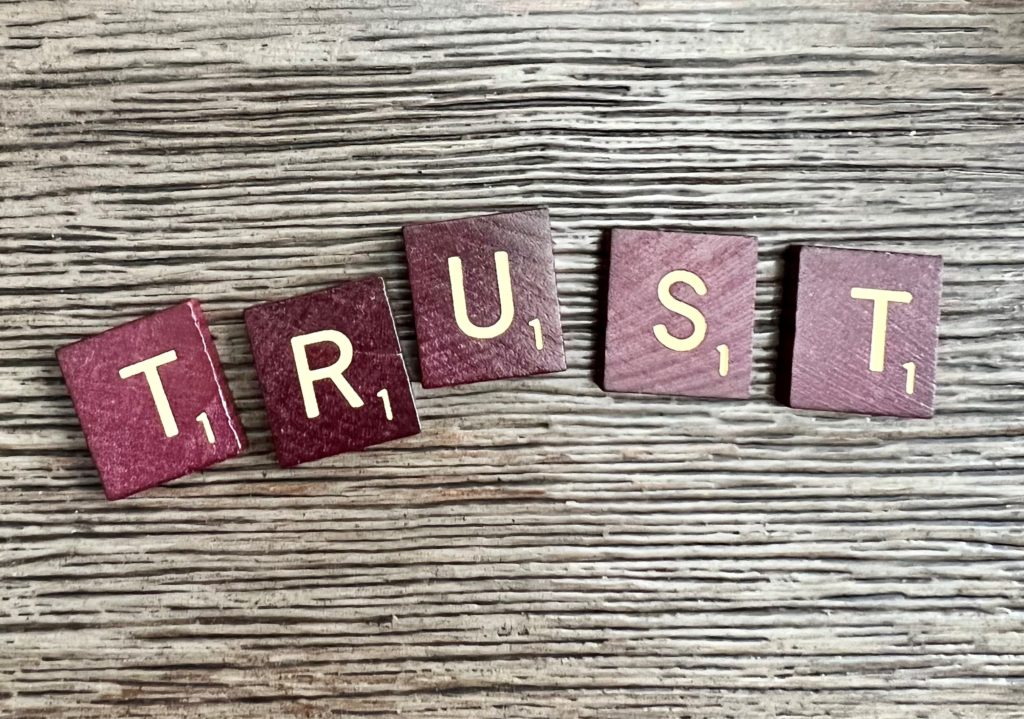Trust

If you don’t have trust in a team, you don’t have a team. You have a collection of people assigned to work together. In late 2015 I was very excited to get my dream assignment. I went to specialized training and thought this was what I would do for the rest of my life. When I arrived at my new “team,” I was welcomed with suspicion and two-faced interactions. The cut-throat attitude caught me off guard. I lost that opportunity within the year because I wasn’t prepared to adopt the culture and was pushed out. That collection of individuals could have been a fantastic team. Unfortunately, trust wasn’t part of their culture.
It wasn’t until later that I learned why trust is such a hard thing to find. Our survival mechanisms are set as a default to be suspicious. We are what is called “negative primed.” This means that we will always react to negative information faster because, in the past, it meant that we might be dinner for a predator. The news organizations understand this principle more than everyone. They know that fires, murders, destruction, and corruption sell newspapers. Then with the advent of television, we could see videos of all the terrible things. Finally, we witnessed the atrocities in real-time with live coverage and the internet. Bad news sells; the good news is ignored. This is also why it is so hard to build trust between individuals and even harder between teams.
A Thousand Favors

The one thing all high-performance teams have in common is the high level of trust they have. But how did they get to that level? One way to develop trust is by proving you are trustworthy daily by providing a “thousand favors.” The thousand favors concept is built around the theory of reciprocity and reducing the feelings of shame. It had just snowed, and my buddy and his family were out of town. The problem with where he lived was that if you didn’t sweep the snow off the steep steps, it would freeze over and become a real danger just trying to get to their door. They would be back the next day, but it would be too late by then. I happened to be in the neighborhood and stopped by his house to remove the snow from his steps. This small act encapsulates the idea of doing favors that are small without being asked. The small favors are easy to receive and don’t create any feelings of debt. When each team member is thinking like that towards the other team members, we begin to see our team members not as a threat, and trust can develop.
Trust happens over time with consistency and diligence. It may take many small favors to demonstrate to other people that trustworthiness is part of your character. Once done, more effort will be required to keep the trust because losing any trust is much easier than building it. It only takes one misstep, to prove to our survival mechanism, that you are a threat, and all the work will be undone. As a team, we have to feel safe to maximize our productivity. We need to trust the other members to have our back to go all-in. When we achieve this level, there isn’t anything the team will not be able to accomplish. To build a team, you first need to develop trust.
The 3 Rules of Trust
I realized that when the words left my mouth, the situation would take a turn for the worst. People don’t feel safe when you tell them that they may be removed from their position for failing to perform. What people need to perform well is psychological safety based on organizational trust to give them a space to fail forward. Since then, I have three Rules of Trust that need to be kept to develop and keep any level of trust; rule one is People before Paper, rule two is Keep the Secrets, and rule three is Be Vulnerable. All three work together, and as a leader, you cannot falter on even one. The first rule is based on being able to listen to those around you.
Rule 1: People before Paper
Have you ever been too busy to listen? You are sitting at your desk working diligently on your fifth email for the morning, and someone comes and interrupts your flow. Irritated, you turn and look at them with annoyance. Feeling that it isn’t the right time, they dismiss themselves, allowing you to get back to your email. You didn’t know that they came to you to ask for your help. Their kid had gone into the hospital, and they were asking if they could leave to be with them. But they never got that far in the conversation. It was apparent that your priorities were the email.
Have you been on either side of that little story? I have been on both, and it wasn’t until later that I realized the error in not learning how our actions make people feel. This was when I came up with the People before Paper rule. The rule means to drop any paperwork you are doing if interrupted by a living and breathing person. The rule reminds us that people are the most critical noun in an organization and that none of the work will get done if they are not treated right. So next time someone comes to you, stop what you are doing, and be 100% present with them. Please give them your full attention and make it so they do not doubt that you have their back. Without this, there cannot be any trust.
Rule 2: Keep the Secrets
Gossip is the team killer. We tell each other our secrets as a sign of trust and connection. To know something that no one else does makes us feel special, but just one moment of gossip can destroy everything. I quickly learned that I needed a zero-tolerance policy for gossip on my teams after an incident that scared me to the core. I almost lost a team member to suicide because she overheard some gossip about her. The gossip came from the senior manager talking with her supervisor, and she just happened to be in earshot. She was shocked that the senior manager would reveal what she had told him confidently. Unfortunately, he had taken what she said and twisted it into something that showed he did not have a very high opinion of her. While she didn’t tell those things to her supervisor, her situation escalated when the supervisor didn’t stand up for her. Afterward, she felt personally attacked and that her bosses were out to get her. By the time I came into the situation, she had been sitting in her car in the work center parking lot with extreme anxiety for two hours. Realizing her state, I took her to talk with the senior managers above our local level and got her the help she needed. This is the destructive power of gossip.
When we keep each other’s secrets, we have an opportunity to show our trustworthiness. Sharing private matters deepens our connection with other human beings and satisfies our craving for a sense of belonging. We become part of a bigger story for the group by sharing our stories. Since we want this collectiveness, we are willing to pay the price of risking our secrets being exposed in the hopes of trust. When we tell each other our secrets, it allows us to be vulnerable. Vulnerability is the key to having hard, meaningful conversations.
Rule 3: Be Vulnerable
When we can completely trust the people on our team, it allows us to go “all in” on the team’s work. To do so, we must be vulnerable with one another. It wasn’t long ago that I didn’t know how to deal with emotional conversations. And to some extent, I still don’t. Recently, I had an emotional outburst that I wasn’t very proud of the morning after. The whole event made me physically sick to my stomach, and I spent much of the night in the bathroom. I wasn’t handling my emotions very well, which made it more challenging to see the needs of others. Everything compounded, and I couldn’t find the capacity to be vulnerable in the end. I couldn’t clearly state my emotional state before the outburst, which led to a series of events that destroyed any sense of safety on the team. My lack of vulnerability created a negative situation that may take years to resolve.
Sigmund Freud said, “Out of our vulnerabilities will come your strength.” I wasn’t strong that day, but it highlights what is required to build effective teams. We need to trust our vulnerability to connect deeply with other team members and become a stronger team. As my example above shows, this cannot be easy. Knowing what to do isn’t enough. We need to develop the capacity to act on that knowledge. As we strengthen our capability to connect with other team members, we create genuine empathy for one another. We give them the benefit of the doubt and act as if they always have our best interest. The secret sauce of every high-performance team is this type of trust built on vulnerability.
Key Take-Away

It is important to remember that the three Rules of Trust (People before Paper, Keep the Secrets, and Be Vulnerable) were developed through my attempts to understand practical processes to create outstanding teams. I’ve experimented with these and many other ideas to conclude after 20 years that trust is tough to get and super easy to lose. So once you have it, fight like hell to keep it!

